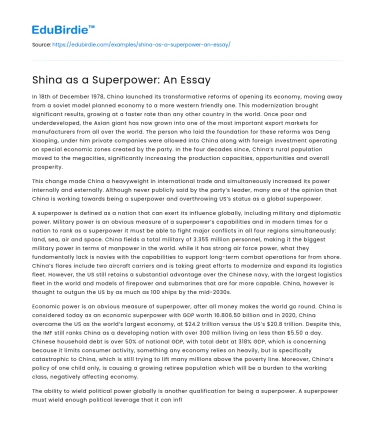In 18th of December 1978, China launched its transformative reforms of opening its economy, moving away from a soviet model planned economy to a more western friendly one. This modernization brought significant results, growing at a faster rate than any other country in the world. Once poor and underdeveloped, the Asian giant has now grown into one of the most important export markets for manufacturers from all over the world. The person who laid the foundation for these reforms was Deng Xiaoping, under him private companies were allowed into China along with foreign investment operating on special economic zones created by the party. In the four decades since, China’s rural population moved to the megacities, significantly increasing the production capacities, opportunities and overall prosperity.
This change made China a heavyweight in international trade and simultaneously increased its power internally and externally. Although never publicly said by the party’s leader, many are of the opinion that China is working towards being a superpower and overthrowing US’s status as a global superpower.
A superpower is defined as a nation that can exert its influence globally, including military and diplomatic power. Military power is an obvious measure of a superpower’s capabilities and in modern times for a nation to rank as a superpower it must be able to fight major conflicts in all four regions simultaneously: land, sea, air and space. China fields a total military of 3.355 million personnel, making it the biggest military power in terms of manpower in the world. while it has strong air force power, what they fundamentally lack is navies with the capabilities to support long-term combat operations far from shore. China’s flares include two aircraft carriers and is taking great efforts to modernize and expand its logistics fleet. However, the US still retains a substantial advantage over the Chinese navy, with the largest logistics fleet in the world and models of firepower and submarines that are far more capable. China, however is thought to outgun the US by as much as 100 ships by the mid-2030s.
Economic power is an obvious measure of superpower, after all money makes the world go round. China is considered today as an economic superpower with GDP worth 16.806.50 billion and in 2020, China overcame the US as the world’s largest economy, at $24.2 trillion versus the US’s $20.8 trillion. Despite this, the IMF still ranks China as a developing nation with over 300 million living on less than $5.50 a day. Chinese household debt is over 50% of national GDP, with total debt at 318% GDP, which is concerning because it limits consumer activity, something any economy relies on heavily, but is specifically catastrophic to China, which is still trying to lift many millions above the poverty line. Moreover, China’s policy of one child only, is causing a growing retiree population which will be a burden to the working class, negatively affecting economy.
The ability to wield political power globally is another qualification for being a superpower. A superpower must wield enough political leverage that it can influence the politics of any region, having a say in all global affairs, which for the moment hedges out most nations from superpower status. China has important political influence in South and East Asia, forming strong trade agreements and having a heavy say and influence in their political situation. Moreover, China has expanded its influence in Africa where they are exploiting their resources in return of helping and pulling countries out of poverty, despite not interfering with their form of governance, this economic move comes hand in hand with their expansion of their political and diplomatic relations, having more countries under their radar.
A superpower must be a center of innovation and lead the way in the technological area, however with the decentralized nature of our world It is extremely difficult to achieve technological hegemony. Despite this, China is an emerging tech-giant and it has some of the biggest tech company such as Baidu, Alibaba, Tencent and Xiaomi.
Lastly, there is the least obvious measure of superpower that is often overlooked, and yet is sometimes even more important than military, political and economic power, that is cultural power. Cultural power often paves the way for the expansion of political and economic power. Xi Jinping has seen cultural influence as so vital to overthrowing the United States as a global power, that he has invested heavily in the nation’s film industry. the Chinese international box office is steadily growing and in direct attack on the US, China has moved to become a major economic partner in American studios and theatre chains, working to influence American filmmaking towards Chinese ends. China’s global influence however remains largely limited to the economic sector, as Chinese culture struggles to create or define any global trends against the deeply entrenched American culture. Despite the world’s most popular app, TikTok, being Chinese owned, internal strategy sessions called for the app to cater to American social media stars in order to successfully grow internationally. Today China struggles to promote and expand its cultural influence while the US continues to define the global standard for culture.
In the end, China’s authoritarianism, censorship, lack of democratic values and a continued genocide against religious minorities all works to turn the world off from Chinese culture, making it very difficult for China to achieve its aim of winning the global dominance battle with the US.






 Stuck on your essay?
Stuck on your essay?

